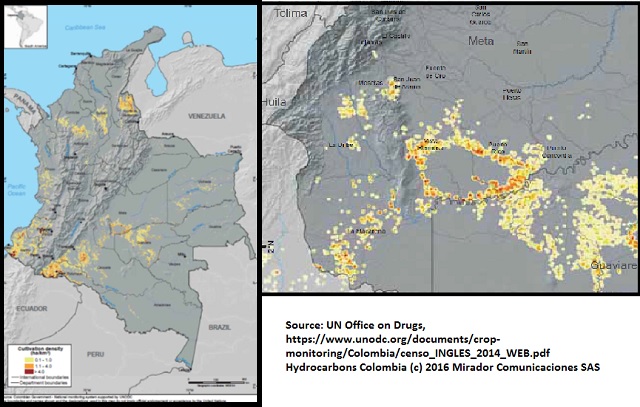The Ministry of Mines and Energy (MinMinas) has announced that Carlos Andrés Cante will replace María Isabel Ulloa, as the Vice Minister of Mines, and will continue her work in consolidating a unified national mining policy.
At the end of March of this year, the government announced the start of formal talks with the ELN guerrilla group. The talks are to move in parallel to the process with the Farc, which is in its final stages after nearly four years.

We found these maps that show areas of high intensity coca growing and many of these areas just ‘happen’ to coincide with zones of anti-oil fervor.
The Centro Democratico party of Senator Alvaro Uribe kicked off a “firmaton”, a campaign to collect signatures and a call for civil resistance, just as the peace talks and the legal instrument which will be used to approve a final agreement reaches a critical moment.

While the country’s main producing departments, Meta and Casanare had an RRR below 1.0, lower-producing departments had even worse performance, some important ones even were negative.
Community members from Íquira, Huila have called for the environmental license of Telpico to be revoked launching a number of accusations against the process. The local environmental management agency, CAM, is investigating and said that the local ordinance laws (POT) are appropriate for local leaders to control extractive projects.
Controversy surrounds the confirmation of Rodrigo Suarez as President of the National Environmental Licensing Agency (ANLA). Fernando Iregui is still in the chair and some even say he will stay there.
Despite assurances from leaders of the UTEN oil workers union, which affiliated Pacific E&P workers in the Rubiales field, Ecopetrol (NYSE:EC) has confirmed it will not use the UTEN workers, it will hire a completely new workforce, in a victory for the more militant USO union.
With a 5% contribution to Colombia’s GDP, a 25% share of Foreign Direct Investment and 40% of Colombia’s exports, there is little room for discussion of what the industry has contributed in the past. But what does the future hold?
The National Planning Department (DNP) sounded the alarms on 144 royalty funded projects which are in a “critical” state and need immediate intervention to avoid further problems, worth a total of CoP$1.2T (US$400M).